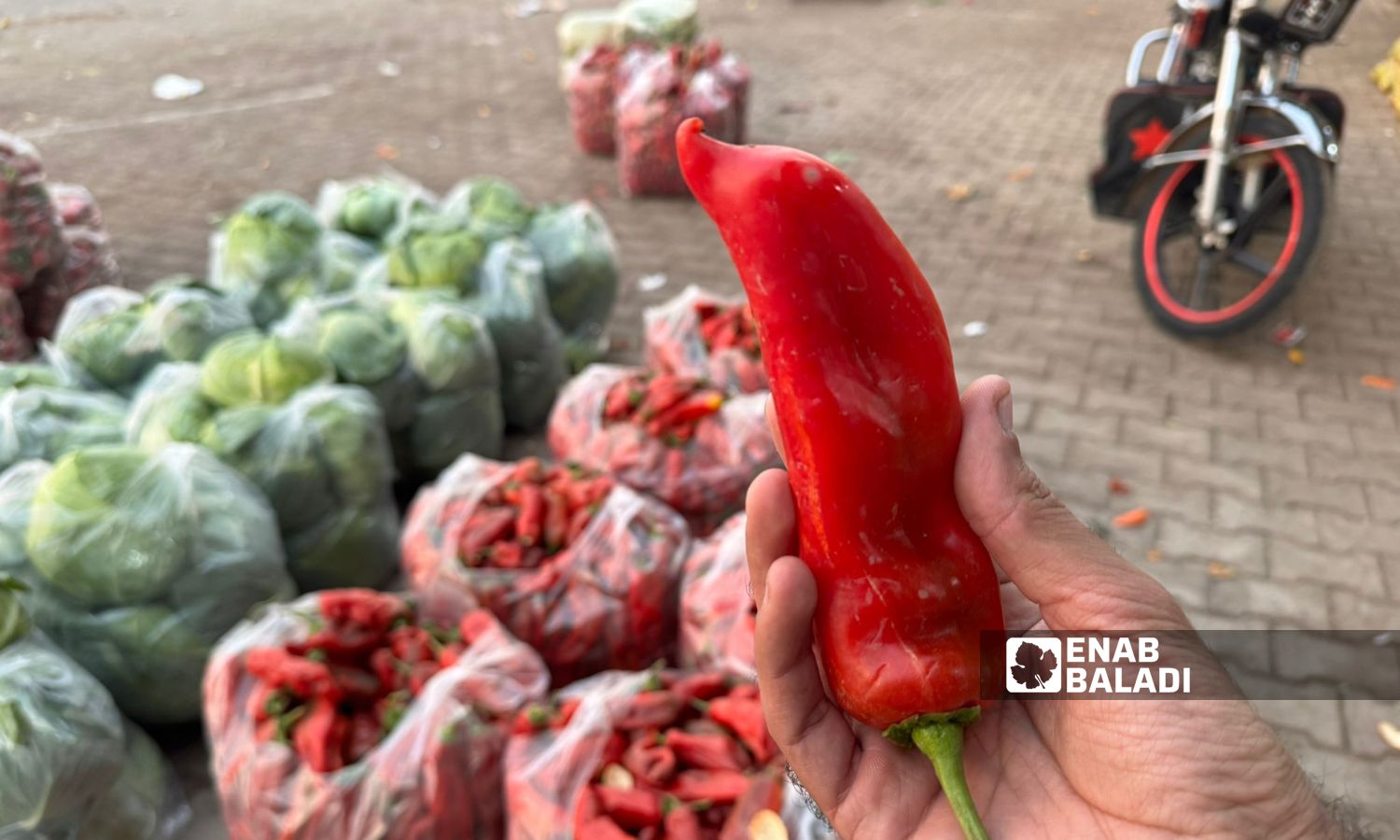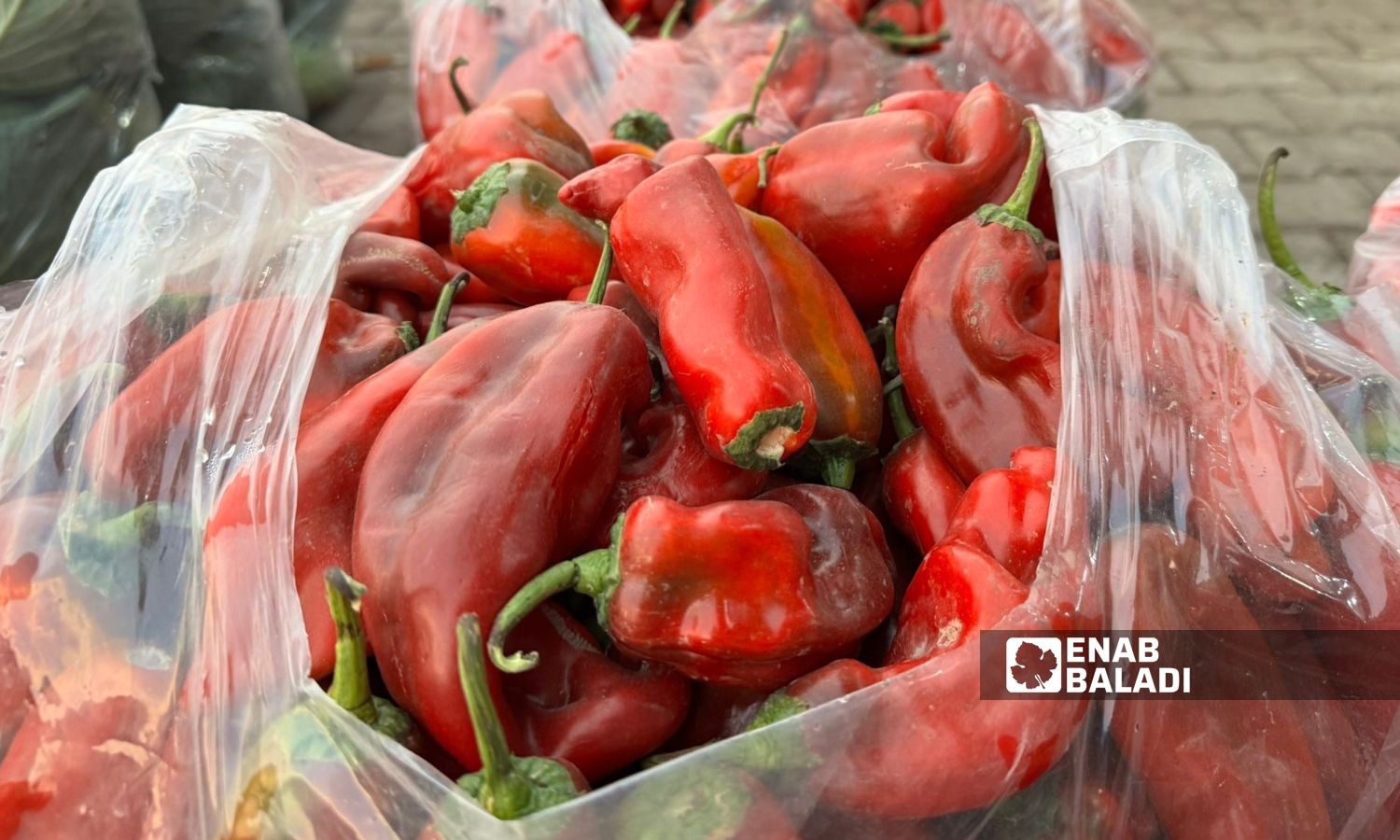



Salqin – Dayan Junpaz
For Ms. Siham Nafakh, a resident of Salqin in northern Idlib, red peppers have become more than just a traditional pantry item; they are a seasonal product awaited to generate income for her family.
At the beginning of November, the red pepper season in Salqin and its countryside ended, prompting Nafakh to start storing about 600 kilograms of peppers, a task she has become accustomed to every season.
Nafakh told Enab Baladi that she allocates 200 kilograms for her family’s consumption while preparing another 400 kilograms for sale during the winter months.
She added that she is keen on choosing various types of peppers, whether hot or sweet, to suit different uses, such as pickling and others.
Nafakh is one of many housewives who rush during the pepper season, which is a popular crop in the region, to prepare and secure enough quantities for winter storage and selling to provide additional income.
Red peppers are considered an essential part of household storage in Salqin, and preparing pickled peppers requires selecting firm fruits to ensure quality, and then soaking them in a special brine to give them a distinctive flavor, according to Nafakh.
Soft peppers are used to make pepper paste, and she dries some of them to store for long periods, selling them later.
Regarding prices, Nafakh mentioned that a jar of pickles (one-liter jar) sells for 70 Turkish lira, while a kilogram of pepper paste sells for 125 Turkish lira, and the price of ground peppers is 150 Turkish lira.
Nafakh relies on making preserves as a means to support her family’s income, consisting of seven members, in addition to her sewing work.
She buys peppers from local markets, as she does not own agricultural land, and she carefully prepares them for sale in Salqin and some nearby areas upon request.
Although the profit margin varies depending on the season and market conditions, selling these products provides her with an additional source of support that contributes to improving her family’s standard of living, as she puts it.

Women in Salqin, northern Idlib, prepare peppers for storage and selling them – November 14, 2024 (Enab Baladi/Dayan Junpaz)
The work of women in preparing and storing peppers is a popular activity in Salqin, as many women rely on these jobs as an additional source of income. Some women prepare, store, and sell the peppers on demand.
Meanwhile, other women work on preparing peppers for families for a wage that varies between 2 and 3 Turkish lira per kilogram.
Additionally, there are mills in Salqin that sell and prepare diverse pepper products, providing grinding services for residents and offering products ready for consumers.
Ahmad Said, a mill owner in Salqin, told Enab Baladi that the pepper season does not end with the last harvest but can be utilized in innovative ways.
He pointed out that dried peppers can be turned into fine powder used for various food purposes, including pepper paste and hot chili powder for pies and pizzas.
Said added that the grinding fee for one kilogram of dried peppers ranges from 10 to 15 Turkish lira, while ground pepper ready for sale costs about 150 Turkish lira per kilogram.
The price for a kilogram of ready-made pepper paste is around 90 Turkish lira.
Ms. Rihab Mustafa, a resident of Salqin, mentioned to Enab Baladi that she stores about 300 kilograms of red peppers as part of her family’s winter pantry, which consists of five members.
She makes sure to divide this quantity into several parts for various uses, adding that she dedicates a portion for de-seeding the peppers, which she then grinds to make fine pepper for garnishing dishes such as hummus, mutabbal, and fava beans.
The other type of de-seeded pepper is ground using a machine and is used to prepare what is locally known as “pepper bread,” a type of tandoor bread or saj bread that is spread with a pepper mixture, topped with sesame seeds and black seeds.
Another use involves stringing the peppers together with a special needle and thread to dry them, adding this type to raw kibbeh and tabbouleh dishes.
Mustafa pointed out that peppers are part of the identity of the region’s residents, as their use in dishes reflects a rich heritage and inherited traditions across generations.
The activity of these projects stems from the lack of job opportunities, diminished purchasing power, and insufficient income from the husband or family provider, as daily wages for workers range between 70 and 100 Turkish lira, which are insufficient to meet the basic needs of the family.
if you think the article contain wrong information or you have additional details Send Correction